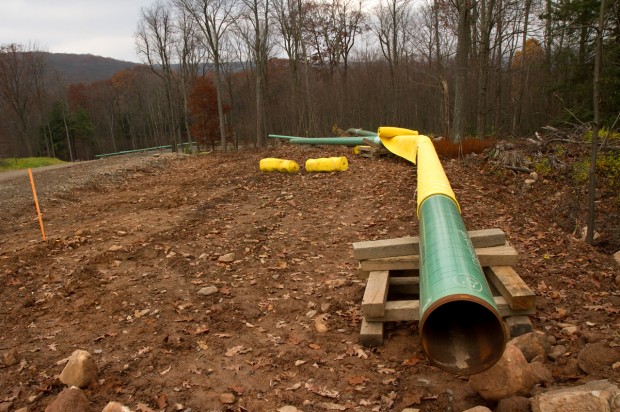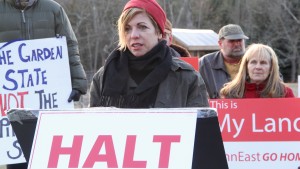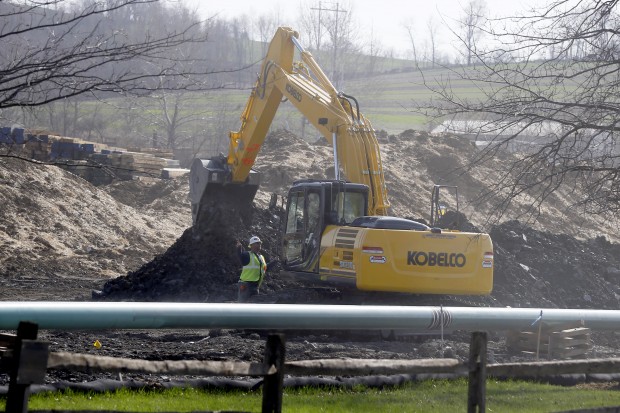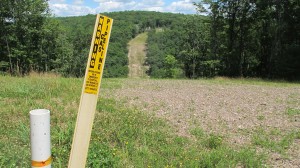Worker dies in pipeline accident, PUC steps up calls for reform
-
Susan Phillips
A man operating a backhoe, who struck and hit an unmarked, high pressure gas line last July has died of his injuries. StateImpact reported on the incident last August in a piece about unmapped and unregulated rural pipelines. Gas and pipeline safety advocates say it was a tragedy that did not have to happen. But as an example of how unregulated rural pipelines are, neither the federal Occupational Safety and Health Administration, nor the state Public Utility Commission, has the authority to issue any violations or fines to the company who owned the unmarked line.
During a call with reporters Thursday promoting recommendations by the Governor’s Pipeline Infrastructure Task Force, Department of Environmental Protection Secretary John Quigley pointed to the recent death as an important reason why current regulations need to change.
Gathering lines, all those thousands of miles of smaller pipe that get the gas from the wellhead to major transmission pipelines are not regulated in rural areas, which is where most of them are in Pennsylvania. These rural lines are designated as “class one.” The DEP estimates 10,000 new miles of gathering lines will be built as class one lines in the next decade. And yet, there are no local, state or federal rules on how deep the lines should be buried underground, or even if they’re buried at all. There are no standards for building and maintaining the lines. They don’t have to be marked. And the operator of the line doesn’t have to participate in PA One Call, which led to the fatality in Armstrong County.
A report to the General Assembly on gathering lines by the Corbett Administration all the way back in 2012 recommended greater oversight, but so far there’s been no action.
The Governor’s task force has flagged the issue of PA One Call participation for rural gathering lines as a top priority. And the idea is not new. This is something that the Pennsylvania Public Utility Commission, and PA One Call, has been pushing for years. And although members of the Marcellus Shale Coalition agreed to participate in PA One Call voluntarily, smaller, independent operators represented by the Pennsylvania Independent Oil and Gas Association, or PIOGA, have pushed back against any changes.
“The risks and the need for assurance for safety when you dig is a critical issue,” PUC Vice Chairman Andrew Place told StateImpact. “A backhoe doesn’t discriminate between a class one or a class two line. [We’re playing] backhoe roulette.”
And that game resulted in a devastating explosion in Worthington Township, Armstrong County on July 15, 2015. A contract crew working for EQT was using a bulldozer to excavate for a new natural gas pipeline in the rural area. The contractor did what it was supposed to do. It called PA One Call, which sends out “tickets” to any utility registered with having underground facilities in the vicinity. The utilities then send out crews to mark their lines.
But at least one high pressure gas pipeline, operated by Snyder Brothers of Kittanning, was not marked because the company was not registered with PA One Call in the area. A man operating the bulldozer hit the line and it blew up. Television footage shows a charred cab surrounded by scorched earth. He was sent to the hospital with 70 percent of his body burned, and about five months later, he died.
Snyder Brothers has not responded to requests for comment. The company operates about 100 shale gas wells, mostly in Armstrong County. DEP has issued 40 violations to Snyder Brothers, fining the company $13,025. So far, Snyder Brothers has not received any sanctions for the pipeline hit on its unmarked line because it did not violate any federal or state laws. It’s unclear whether the Department of Labor and Industry has authority, the agency wouldn’t comment saying the investigation is ongoing.
In another matter, Snyder Brothers is in a legal dispute with the PUC over $500,000 in unpaid impact fees.
PUC: Eliminate the rural exemption
PUC Commissioner John Coleman has been lobbying for the passage of House Bill 445, which is now in the Consumer Affairs Committee. If passed, it would do a number of things, including grant the PUC authority over PA One Call, moving it from the Department of Labor and Industry, which currently has oversees the pipeline safety program. HB 445, however, as it’s written now would not eliminate the exemption for rural pipeline operators to participate in PA One Call. The bill is likely to pass as it is written today because the PA One Call law would sunset without the new statute. But the PUC and pipeline safety advocates want the bill amended to eliminate the PIOGA exemption. The PUC is also advocating that rural pipeline operators provide accurate maps of newly built pipelines to emergency responders and state officials, which was also a recommendation by the Governor’s task force. Commissioner Coleman says it’s long past the time to amend the PA One Call law, and force rural operators to participate.
“This unfortunate loss of life by a contractor underscores the very reason we are pursuing the elimination of this exemption,” he told StateImpact. “This is about safety. This won’t be the last time we have an issue with a contractor, with a gathering line, and the exemption that exists in current law.”

Lindsay Lazarski / WHYY
A natural gas gathering pipeline in the Loyalsock State Forest connecting to a Seneca Resources well site. Many companies operating in rural areas, including Seneca Resources, voluntarily participate in PA One Call.
Coleman says that because of additional exemptions to the PA One Call law, the federal government has withheld $150,000 for pipeline safety initiatives. He says the stakeholders have agreed to eliminate those exemptions, which apply to municipalities and to PennDOT. But PIOGA, which represents the smaller operators in rural areas, has been the holdout when it comes to giving up the rural pipeline safety exemption. The federal Pipeline and Hazardous Material Safety Administration has already warned Pennsylvania that if it continues to allow exemptions for rural lines, it will continue to withhold funds.
But PHMSA could easily solve this problem itself by agreeing to oversee and regulate rural lines. Although this has been a topic of discussion at pipeline safety gatherings across the country for several years now, the federal agency has not taken action.
Because the PUC has no jurisdiction over rural gathering lines, it doesn’t have complete data on the number of “hits” that occur in rural areas. But Vice Chairman Place says it’s not uncommon. Before joining the PUC in October, Place was a director with EQT. He also has several gathering pipelines running through his property.
“For both of those reasons, this is very personal,” he said.
PIOGA: One Call too costly, rural lines low risk
The Pennsylvania Independent Oil and Gas Association would not comment for this story. But in the past, PIOGA has pointed to the costs of participation, and said rural pipeline incidents are rare.
Kevin Moody, general counsel for PIOGA, told StateImpact last summer that the One Call program takes a lot of expensive man-hours.
“A lot of our members are mom and pop operations and they don’t have the computer savvy that a lot of larger companies have,” he said.

Emma Lee / WHYY
Jacqueline Evans, whose farm near Stockton, N.J., lies in the path of the proposed PennEast transmission pipeline, speaks out against the project.
It’s true that the cost of mapping older legacy lines could be tens of thousands of dollars. But the PUC says annual costs to participate in One Call are in the hundreds of dollars. And Vice Chairman Place says the PUC agreed to allow the independent, smaller operators in rural areas to map only their newly built lines. As One Call participants, the rural operators would still need to go out and mark old lines if notified of a nearby excavation.
PIOGA’s Moody also told StateImpact that the risks of unmarked lines are minimal in rural areas.
“The accidents that have caused the most property damage and loss of life have not been on gathering lines,” Moody said. “But they’ve been on regulated utility lines. There’s been no demonstration of safety risk on these gathering lines especially ones in rural areas, because these are small diameter, low pressure. Even if they’re hit, they’re not going to cause damage.”
The PUC’s Place disagrees. He says the unmarked pipeline that exploded in Armstrong County was high pressure. And it killed a man.
“This isn’t the image of your grandfather’s 1888 six-inch gas line with 6 psi [pounds per square inch] running through it,” he said. “This was a relatively high pressure line, it was relatively new. It was a significant risk. However, it was exempt by current regulation and to us, that’s an unacceptable risk.”
Place says after years of failed attempts by the PUC to eliminate the rural exemption to the PA One Call law, he’s optimistic HB 445 will get through the legislature.
In addition to calling for the removal of the rural line exemption to PA One Call, the Governor’s Pipeline Task Force also recommended expanding leak surveys to rural lines, accelerating leak repairs on rural lines, creating a centralized mapping system for all pipelines for first responders, and establishing publicly available pipeline inspection reports.
Correction: An earlier version of this article stated that HB 445 would eliminate the rural pipeline exemption to PA One Call. It would not as currently written, the PUC wants the bill amended. Also, Andrew Place worked for EQT as director for energy and environmental policy, not vice president.


















